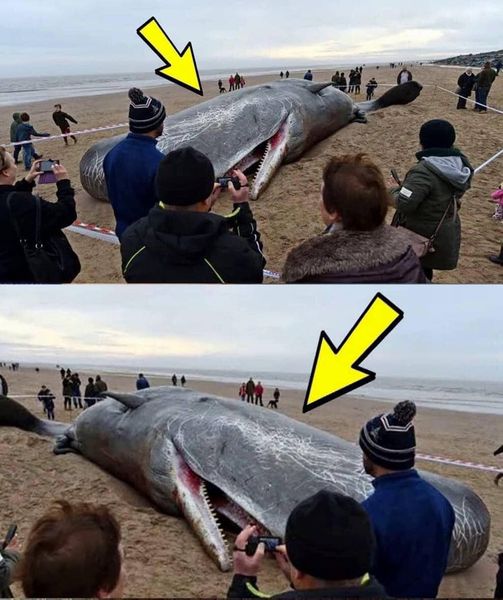In February 2023, a tragic discovery on the shores of Hawaii shook the world and underscored the devastating impact of human negligence on marine life. A massive sperm whale, one of the ocean’s most majestic creatures, washed ashore lifeless. Upon closer examination, scientists uncovered something truly shocking inside its stomach: a horrifying collection of plastic debris and fishing nets. The findings highlighted the growing threat posed by plastic pollution to the world’s oceans and its inhabitants.

The whale, a creature that should symbolize the awe and beauty of the marine ecosystem, had become a victim of the millions of tons of plastic waste dumped into oceans each year. Scientists conducting the necropsy found an assortment of man-made items inside its stomach, including tangled fishing nets, plastic bags, and various pieces of debris. These materials, which have no place in the natural diet of marine animals, had likely caused blockages in the whale’s digestive system, ultimately leading to its death. The discovery painted a grim picture of the ongoing crisis facing marine wildlife.
This tragic incident is far from an isolated event. It serves as a stark reminder of the pervasive reach of plastic pollution. An estimated eight million tons of plastic enter the world’s oceans annually, polluting waters, harming wildlife, and disrupting ecosystems. Marine animals like whales, sea turtles, and seabirds often mistake plastic for food. Once ingested, these materials can cause internal injuries, blockages, and malnutrition. For many species, this leads to slow and painful deaths. The sperm whale found in Hawaii became yet another casualty in this global environmental crisis.
The findings in Hawaii echo numerous other incidents around the world. In recent years, reports of dead whales washing ashore with stomachs full of plastic have become disturbingly common. Each case highlights the same grim reality: humanity’s waste is choking the planet’s oceans. From large items like fishing gear to microplastics that infiltrate the food chain, no marine life is safe from the consequences of this pollution. Even plankton—the foundation of many marine food chains—have been found with traces of microplastics in their systems.
The Hawaii incident has reignited calls for urgent action to combat plastic pollution. Environmentalists and scientists are urging governments, corporations, and individuals to take meaningful steps to reduce the production and improper disposal of plastic. Addressing this issue requires a multi-pronged approach. On a systemic level, policies that restrict single-use plastics, promote biodegradable alternatives, and incentivize sustainable practices in industries are critical. Some countries have already banned items like plastic bags and straws, but global efforts must expand to include comprehensive waste management systems and stricter regulations on industries contributing to plastic pollution.
Public awareness also plays a crucial role in tackling this crisis. Educational campaigns can empower individuals to make small but impactful changes in their daily lives. By reducing reliance on single-use plastics, recycling responsibly, and supporting businesses that prioritize sustainability, people can collectively make a difference. Initiatives like beach clean-ups and community recycling programs not only remove existing waste but also foster a sense of responsibility and commitment to protecting the environment.
Marine conservation organizations have been at the forefront of addressing plastic pollution. Groups dedicated to cleaning up oceans and advocating for sustainable policies have made significant strides in raising awareness and mobilizing resources. However, their efforts alone cannot reverse the damage. Collaboration between governments, corporations, and individuals is essential to create lasting change.
The tragic death of the sperm whale in Hawaii also highlights the interconnectedness of environmental issues. Plastic pollution doesn’t just harm marine life; it affects humans as well. Microplastics have been found in seafood, drinking water, and even the air we breathe. The environmental, economic, and health costs of plastic pollution are staggering, making it imperative for the global community to act swiftly and decisively.
While the discovery in Hawaii is a sobering reminder of the consequences of inaction, it also serves as a call to arms. It challenges humanity to confront the harsh realities of its impact on the planet and take responsibility for the harm caused. Every piece of plastic properly disposed of, every reusable bag or bottle used, and every policy implemented to reduce waste contributes to the fight against this crisis.
The tragic story of the sperm whale should not be forgotten. Instead, it should inspire change, motivating people worldwide to protect the oceans and the creatures that call them home. The future of our planet depends on our ability to address these issues and work toward a sustainable coexistence with nature. By acting now, we can ensure that tragedies like this become a thing of the past, preserving the beauty and vitality of the oceans for generations to come.





